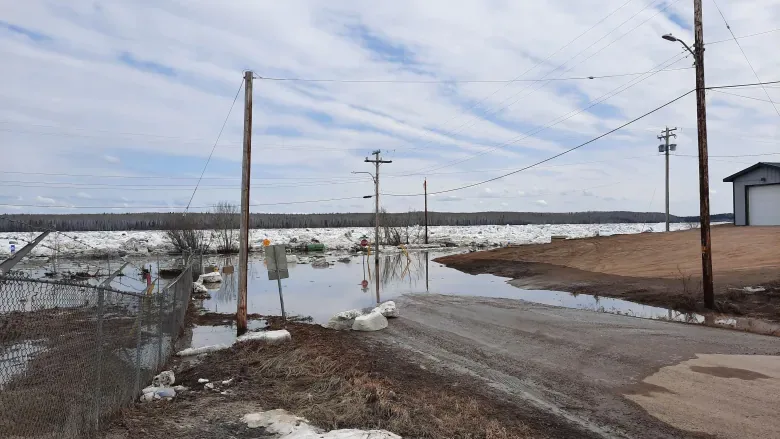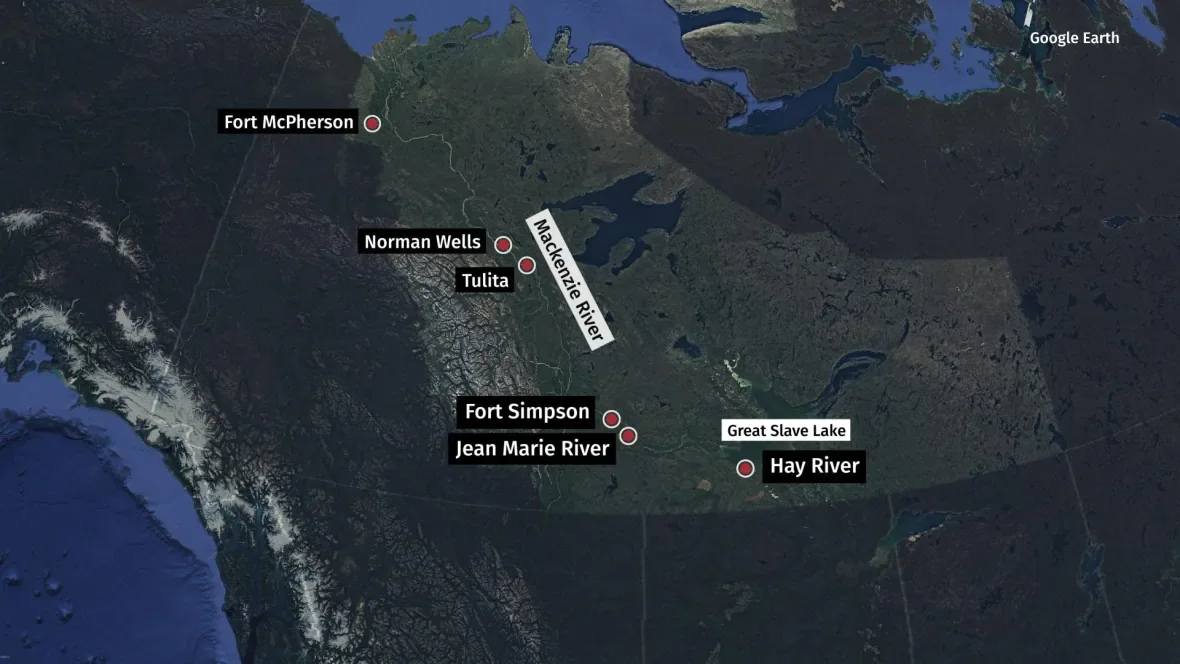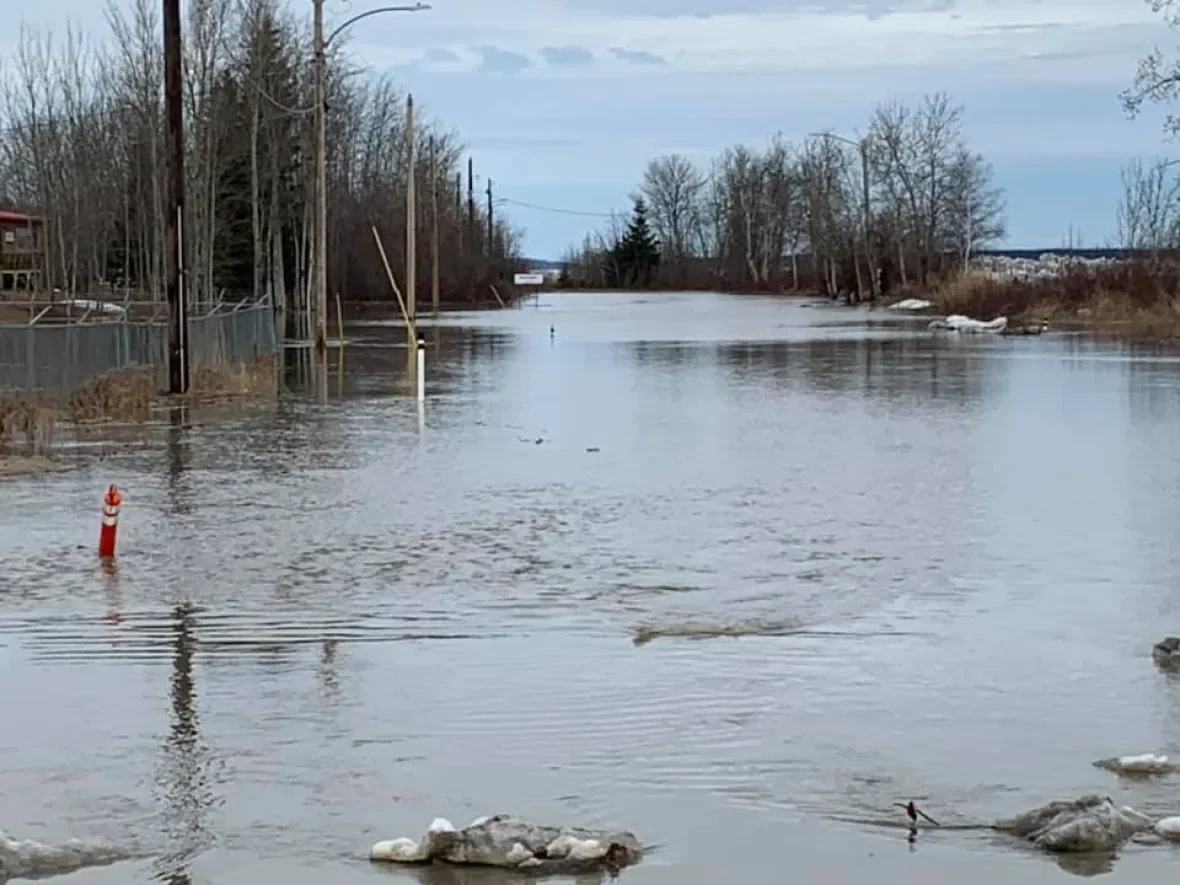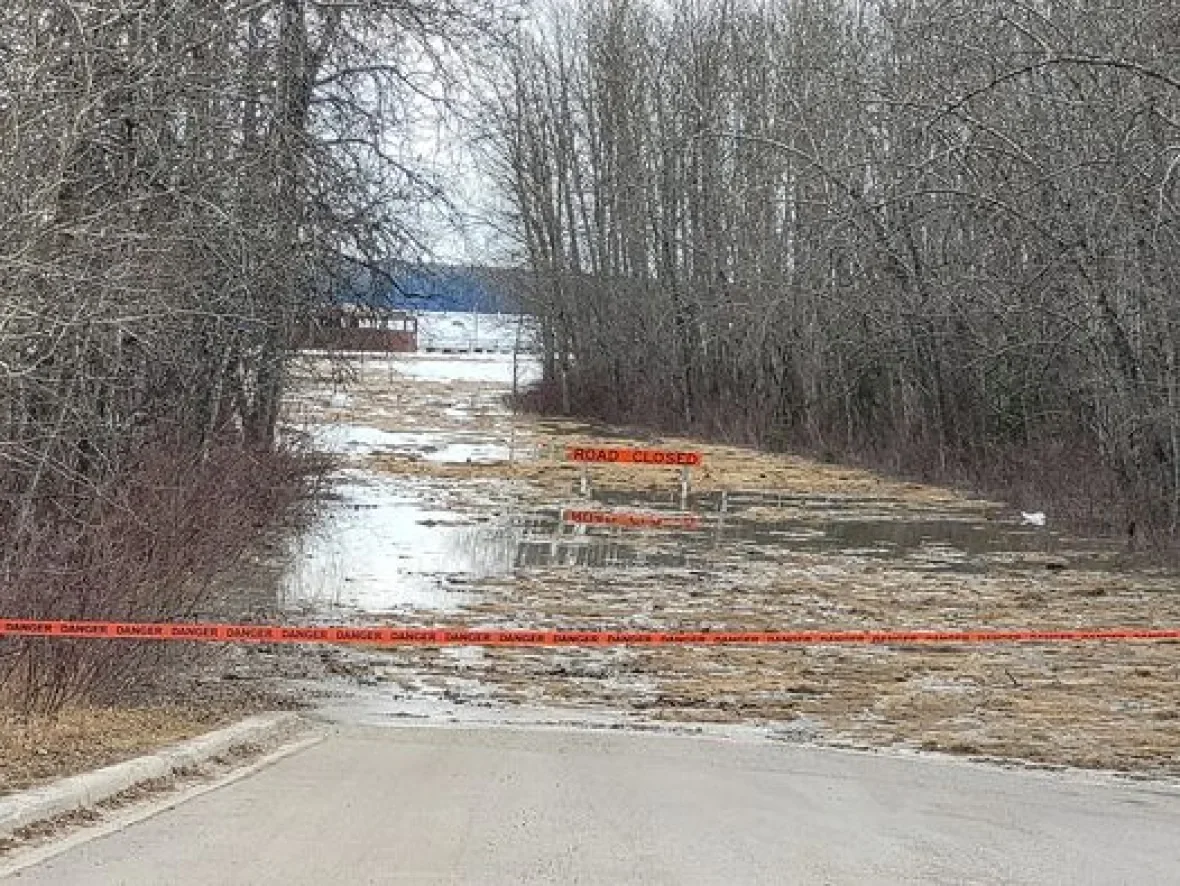
'It is far worse than I thought': NWT communities down river brace for flooding
After seeing the impact of flooding in Fort Simpson and Jean Marie River, N.W.T, the next communities along the Mackenzie River are preparing for a flood year like no other.
Last fall, the river froze with unprecedented high water levels, which is now making for a very unpredictable breakup. Half of Fort Simpson was partly under water and hundreds of residents had to be evacuated. Meanwhile, Jean Marie River, a community of about 100 people, was practically abandoned over the weekend as houses filled with water.
The school and buildings will need major repairs. The smell of fuel still lingers in the air after the powerful flood water and ice blocks uprooted fuel tanks over the weekend.

A road in Fort Simpson flooded with water. Residents were told to evacuate over the weekend because of the extremely high water levels coming into the village. Norman Wells Mayor Frank Pope said they have room for at least 100 people if communities needed to be evacuated. (Sarah Camsell)
Now, communities downstream are readying themselves for what could come.
Mayor Frank Pope in Norman Wells, N.W.T., said the amount of flooding took most by surprise.
"It is far worse than I thought it could ever be," Pope said.
Though the community does not usually flood, the mayor says they are ready to act as an evacuation site for others.
"The Heritage Hotel has told us they will make 20 rooms available in case of emergencies for people who may have to come here and we're looking at getting cots … set up in our community hall for families and people who may need other assistance," he said. "So we're ready to accommodate people from other communities."

A map showing Fort McPherson, Norman Wells, Tulita, Fort Simpson, Jean Marie River and Hay River. All communities are either currently affected or are potentially at risk of flooding. (CBC)
Norman Wells currently has eight elders who were evacuated from Fort Simpson in its elders' centre.
"I feel so badly for the people in Hay River, Jean Marie and Fort Simpson and I hope that's the end of the bad stuff and things will recede and they can get back to normal," Pope said. He acknowledged there's a lot of work ahead of them before that.
Pope said the town currently has space for at least 100 people, but that number could grow once the community hall is set up and, "if we had to, the school gym."

A road flooded in Fort Simpson, N.W.T, on Saturday, one day before a general evacuation was called for the town. (Submitted by Val Nahanni)
Further north, Fort McPherson, N.W.T., has started preparing for flooding by first reviewing its emergency response plans.
Senior Administrative Officer Gary McBride said COVID-19 protocols issued by the chief public health officer may slightly alter those plans.
McBride said the community hall and school gym would be turned into evacuation shelters if the hamlet was to flood, but it wouldn't affect the whole community
"The only concerns we would have are the people at the lower levels and then there's a number of homes and camps out by the ferry crossing and these would be at risk as well."
'MORE AND MORE UNPREDICTABLE'
The flooding of Jean Marie River and Fort Simpson also shocked Tim Tomezynski, Tulita's fire chief.
"We've been notified that the water levels are high and we can see that here as well, but we did not expect to see the results — the absolute horrific results — that have happened since breakup and the flooding began. It was a total surprise," Tomezynski said.
"Since my time here, this has been the worst that I have heard of."

A road closed sign and caution tape blocking a flooded road in Fort Simpson. Tim Tomezynski, Tulita's Fire Chief described the floods as horrific: 'Since my time here, this has been the worst that I have heard of.' (Janice Norwegian)
He said after watching what happened in Jean Marie River, they have organized with a company to empty gas tanks at the lower level of the hamlet if the water rises to a certain point. They have also set up markers to know when to alert residents to start preparing for an evacuation and when they need to leave.
But with all these measures in place, there is still so much uncertainty about what will actually happen.
"It's really hard to gauge this year because the river is acting different, the ice is acting different. It's not like the years past," said Tomezynski, adding the seasons are getting "more and more unpredictable."
Tomezynski said they have people monitoring the river at all times and residents who are at their cabins above and below Tulita are also keeping an eye on things. So far, the Mackenzie has risen about eight feet and there was a bit of cracking ice, but nothing too concerning.
"What we're very worried about … is if the Bear River breaks. That's when something could happen where the water could rush up if the ice gets blocked and jammed where the Bear River meets the Mackenzie. That's where we'll get some higher water and it could rise at a very rapid rate."
If the town was to flood, Tomezynski said only the residents living on the lower road would be affected. The school gym would be opened as an evacuation centre and he is encouraging people to stay with other families members.
"We're really trying to pre-plan and be as prepared as we can because we know how fast it can happen [and the] devastation has really made our resolve even higher."
The minister of municipal and community affairs will be meeting with communities in the Sahtu and Mackenzie Delta regions Wednesday afternoon to check in on flood response preparations and see if they have enough support from the territorial government.
Tomezynski hopes this will give communities the opportunity to, not only share information on what approaches have been working and what have not, but also be there to support each other.
This article was originally published by CBC News and written by Alice Twa.










